Analyzing the Role of Compensation in UAE Modern Organizations
VerifiedAdded on 2020/03/04
|7
|1124
|51
Report
AI Summary
This report delves into the critical role of compensation and reward systems within modern organizations, specifically focusing on the United Arab Emirates (UAE). It explores the significance of effective compensation strategies, emphasizing that a comprehensive approach extends beyond monetary rewards to encompass factors such as benefits, non-monetary advantages, and career development opportunities. The report highlights the importance of understanding employee needs, drawing upon Maslow's hierarchy of needs to illustrate how intrinsic rewards contribute to job satisfaction and employee loyalty. It examines the UAE's compensation policies, including performance-based compensation and employee surveys, and provides examples of how companies like GASCO and Etisalat implement reward systems. The conclusion underscores the value of tailored reward policies in enhancing employee productivity, fostering a competitive advantage, and promoting overall organizational growth.
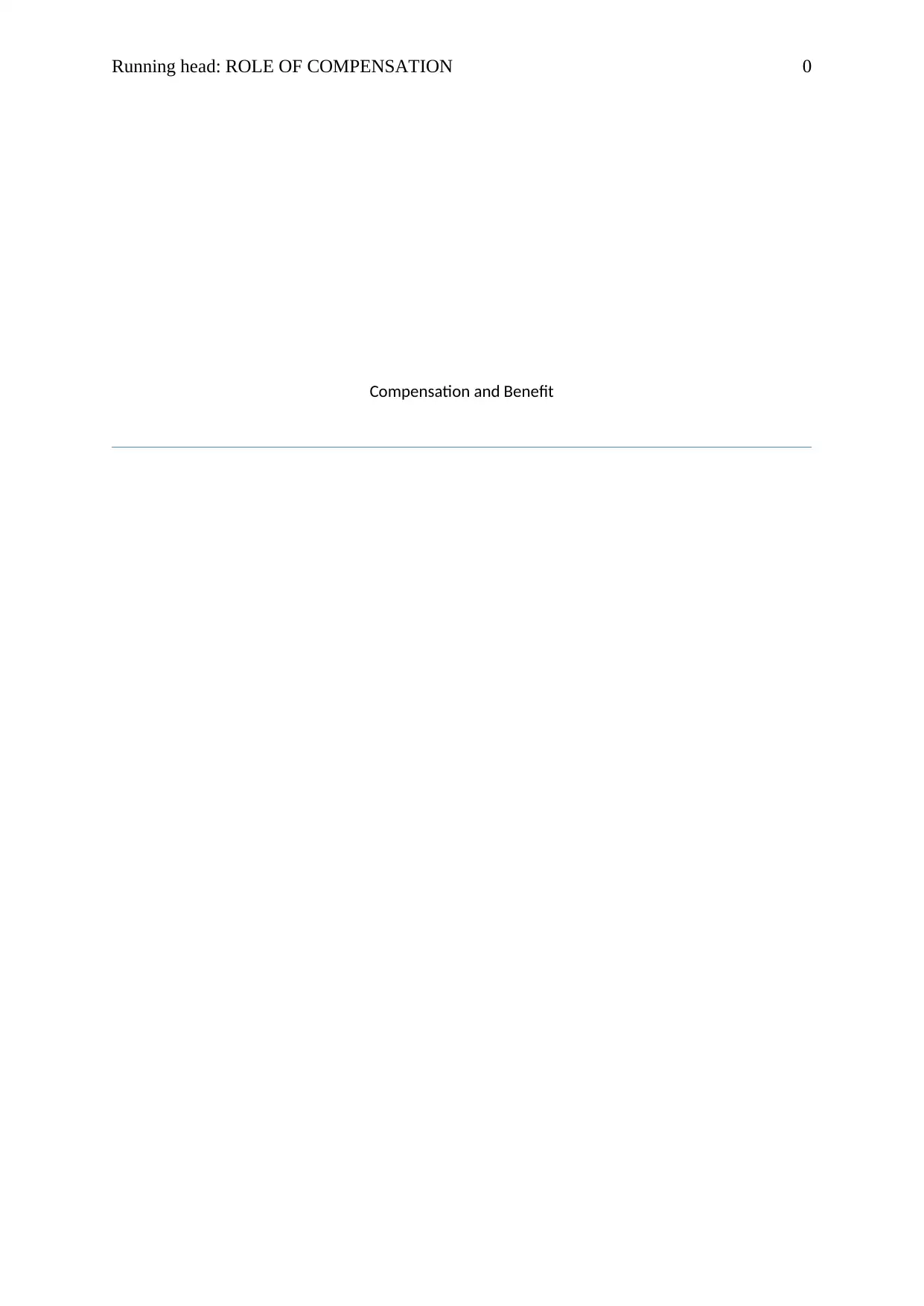
Running head: ROLE OF COMPENSATION 0
Compensation and Benefit
Compensation and Benefit
Paraphrase This Document
Need a fresh take? Get an instant paraphrase of this document with our AI Paraphraser
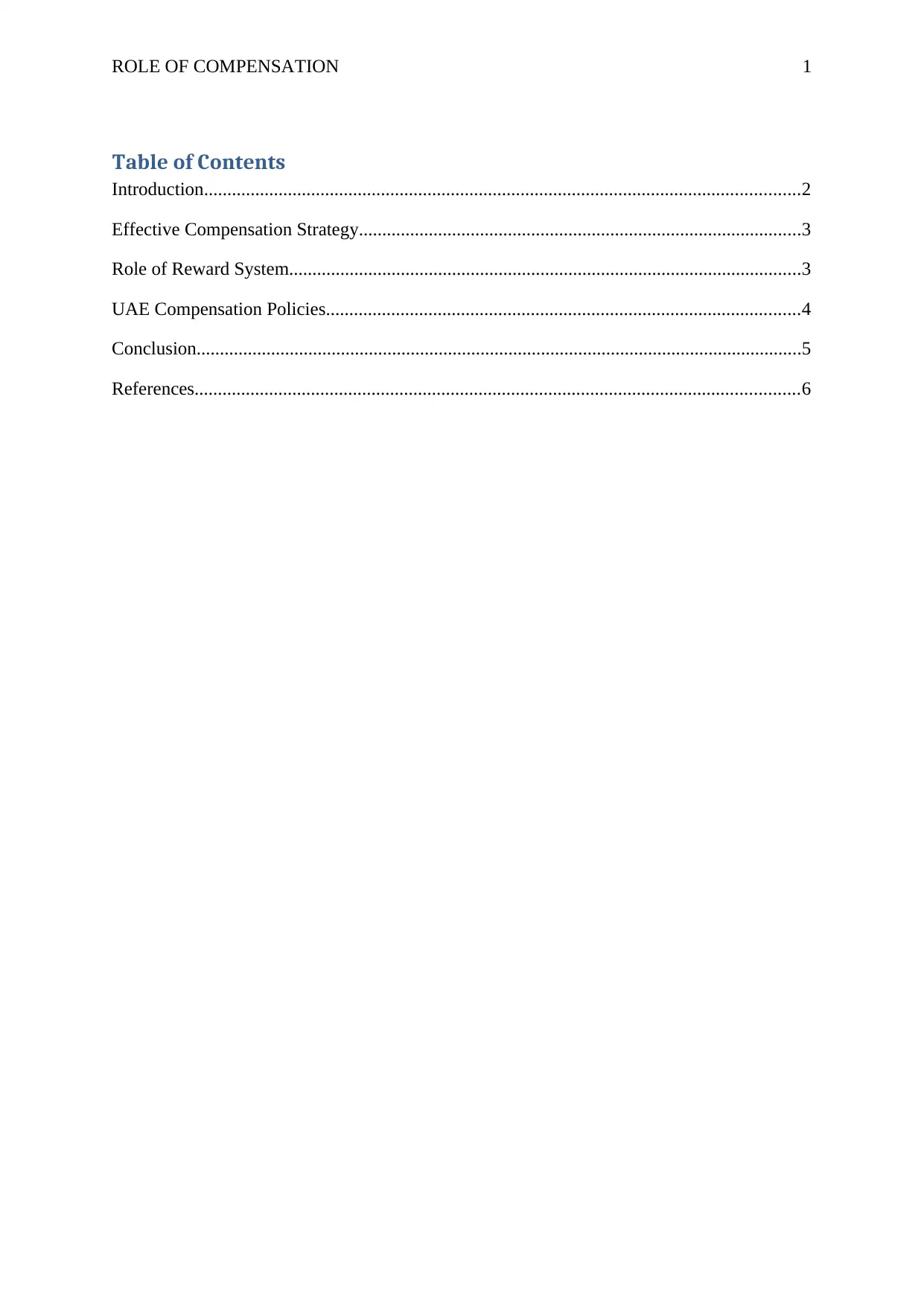
ROLE OF COMPENSATION 1
Table of Contents
Introduction................................................................................................................................2
Effective Compensation Strategy...............................................................................................3
Role of Reward System..............................................................................................................3
UAE Compensation Policies......................................................................................................4
Conclusion..................................................................................................................................5
References..................................................................................................................................6
Table of Contents
Introduction................................................................................................................................2
Effective Compensation Strategy...............................................................................................3
Role of Reward System..............................................................................................................3
UAE Compensation Policies......................................................................................................4
Conclusion..................................................................................................................................5
References..................................................................................................................................6
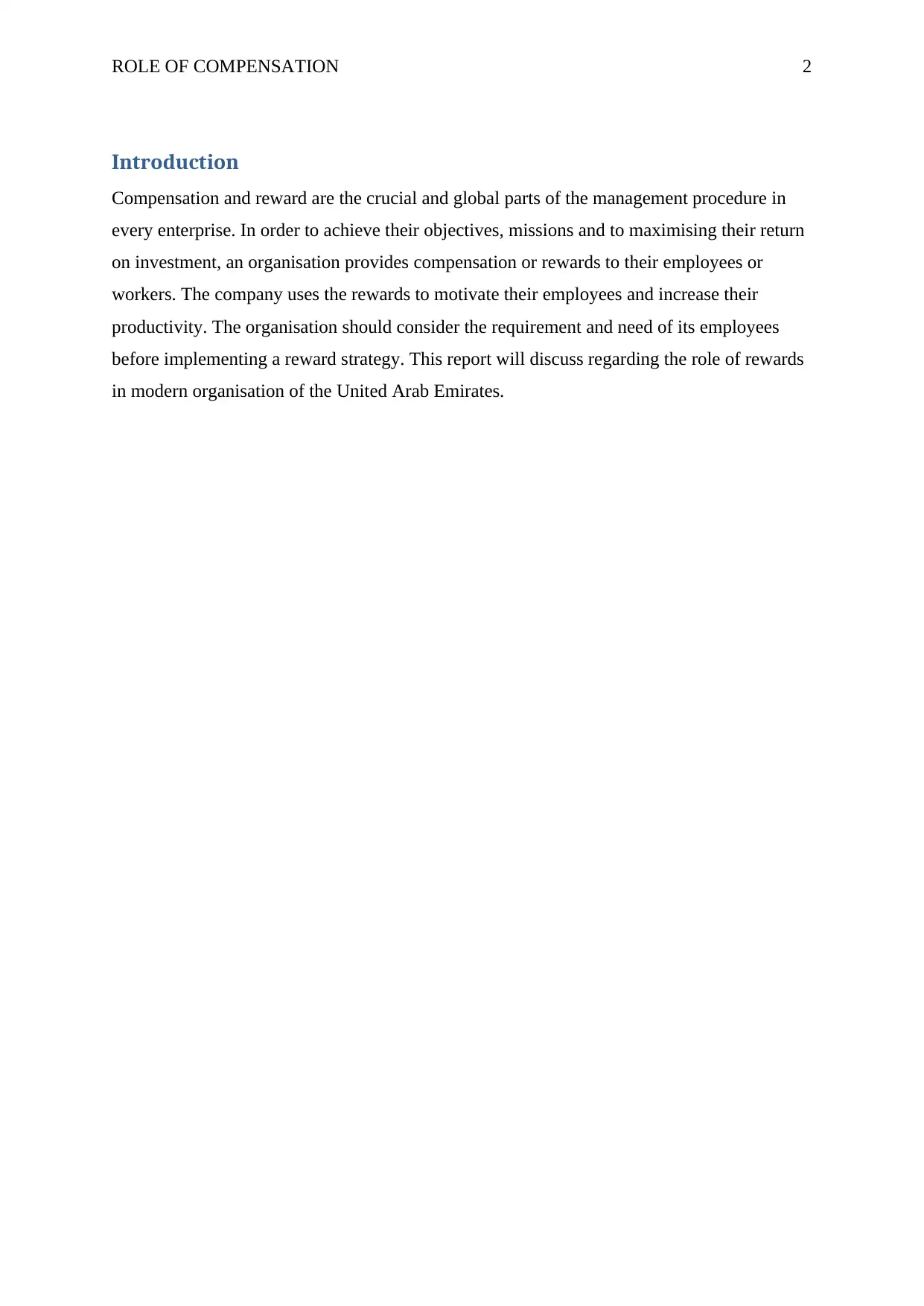
ROLE OF COMPENSATION 2
Introduction
Compensation and reward are the crucial and global parts of the management procedure in
every enterprise. In order to achieve their objectives, missions and to maximising their return
on investment, an organisation provides compensation or rewards to their employees or
workers. The company uses the rewards to motivate their employees and increase their
productivity. The organisation should consider the requirement and need of its employees
before implementing a reward strategy. This report will discuss regarding the role of rewards
in modern organisation of the United Arab Emirates.
Introduction
Compensation and reward are the crucial and global parts of the management procedure in
every enterprise. In order to achieve their objectives, missions and to maximising their return
on investment, an organisation provides compensation or rewards to their employees or
workers. The company uses the rewards to motivate their employees and increase their
productivity. The organisation should consider the requirement and need of its employees
before implementing a reward strategy. This report will discuss regarding the role of rewards
in modern organisation of the United Arab Emirates.
⊘ This is a preview!⊘
Do you want full access?
Subscribe today to unlock all pages.

Trusted by 1+ million students worldwide
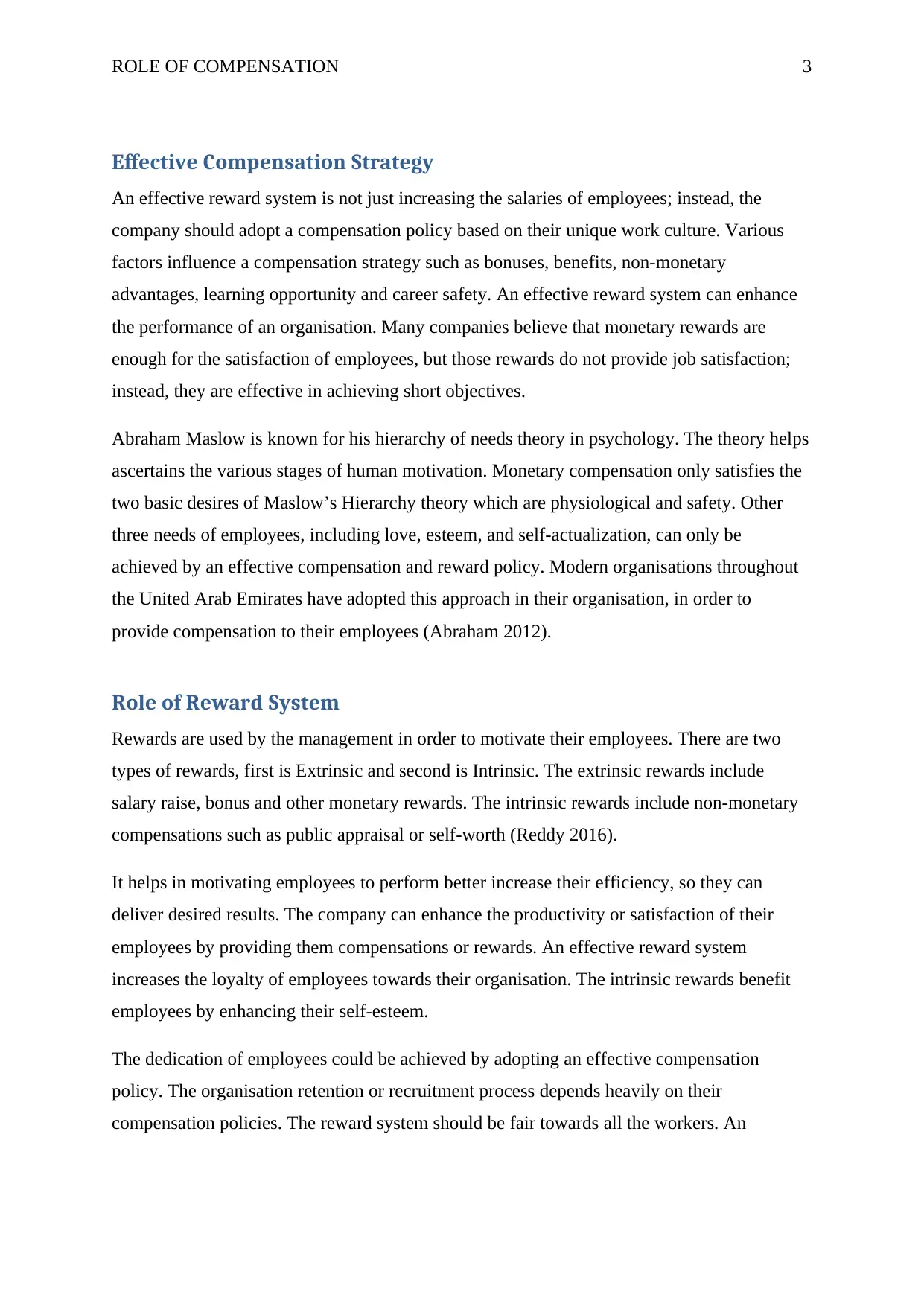
ROLE OF COMPENSATION 3
Effective Compensation Strategy
An effective reward system is not just increasing the salaries of employees; instead, the
company should adopt a compensation policy based on their unique work culture. Various
factors influence a compensation strategy such as bonuses, benefits, non-monetary
advantages, learning opportunity and career safety. An effective reward system can enhance
the performance of an organisation. Many companies believe that monetary rewards are
enough for the satisfaction of employees, but those rewards do not provide job satisfaction;
instead, they are effective in achieving short objectives.
Abraham Maslow is known for his hierarchy of needs theory in psychology. The theory helps
ascertains the various stages of human motivation. Monetary compensation only satisfies the
two basic desires of Maslow’s Hierarchy theory which are physiological and safety. Other
three needs of employees, including love, esteem, and self-actualization, can only be
achieved by an effective compensation and reward policy. Modern organisations throughout
the United Arab Emirates have adopted this approach in their organisation, in order to
provide compensation to their employees (Abraham 2012).
Role of Reward System
Rewards are used by the management in order to motivate their employees. There are two
types of rewards, first is Extrinsic and second is Intrinsic. The extrinsic rewards include
salary raise, bonus and other monetary rewards. The intrinsic rewards include non-monetary
compensations such as public appraisal or self-worth (Reddy 2016).
It helps in motivating employees to perform better increase their efficiency, so they can
deliver desired results. The company can enhance the productivity or satisfaction of their
employees by providing them compensations or rewards. An effective reward system
increases the loyalty of employees towards their organisation. The intrinsic rewards benefit
employees by enhancing their self-esteem.
The dedication of employees could be achieved by adopting an effective compensation
policy. The organisation retention or recruitment process depends heavily on their
compensation policies. The reward system should be fair towards all the workers. An
Effective Compensation Strategy
An effective reward system is not just increasing the salaries of employees; instead, the
company should adopt a compensation policy based on their unique work culture. Various
factors influence a compensation strategy such as bonuses, benefits, non-monetary
advantages, learning opportunity and career safety. An effective reward system can enhance
the performance of an organisation. Many companies believe that monetary rewards are
enough for the satisfaction of employees, but those rewards do not provide job satisfaction;
instead, they are effective in achieving short objectives.
Abraham Maslow is known for his hierarchy of needs theory in psychology. The theory helps
ascertains the various stages of human motivation. Monetary compensation only satisfies the
two basic desires of Maslow’s Hierarchy theory which are physiological and safety. Other
three needs of employees, including love, esteem, and self-actualization, can only be
achieved by an effective compensation and reward policy. Modern organisations throughout
the United Arab Emirates have adopted this approach in their organisation, in order to
provide compensation to their employees (Abraham 2012).
Role of Reward System
Rewards are used by the management in order to motivate their employees. There are two
types of rewards, first is Extrinsic and second is Intrinsic. The extrinsic rewards include
salary raise, bonus and other monetary rewards. The intrinsic rewards include non-monetary
compensations such as public appraisal or self-worth (Reddy 2016).
It helps in motivating employees to perform better increase their efficiency, so they can
deliver desired results. The company can enhance the productivity or satisfaction of their
employees by providing them compensations or rewards. An effective reward system
increases the loyalty of employees towards their organisation. The intrinsic rewards benefit
employees by enhancing their self-esteem.
The dedication of employees could be achieved by adopting an effective compensation
policy. The organisation retention or recruitment process depends heavily on their
compensation policies. The reward system should be fair towards all the workers. An
Paraphrase This Document
Need a fresh take? Get an instant paraphrase of this document with our AI Paraphraser
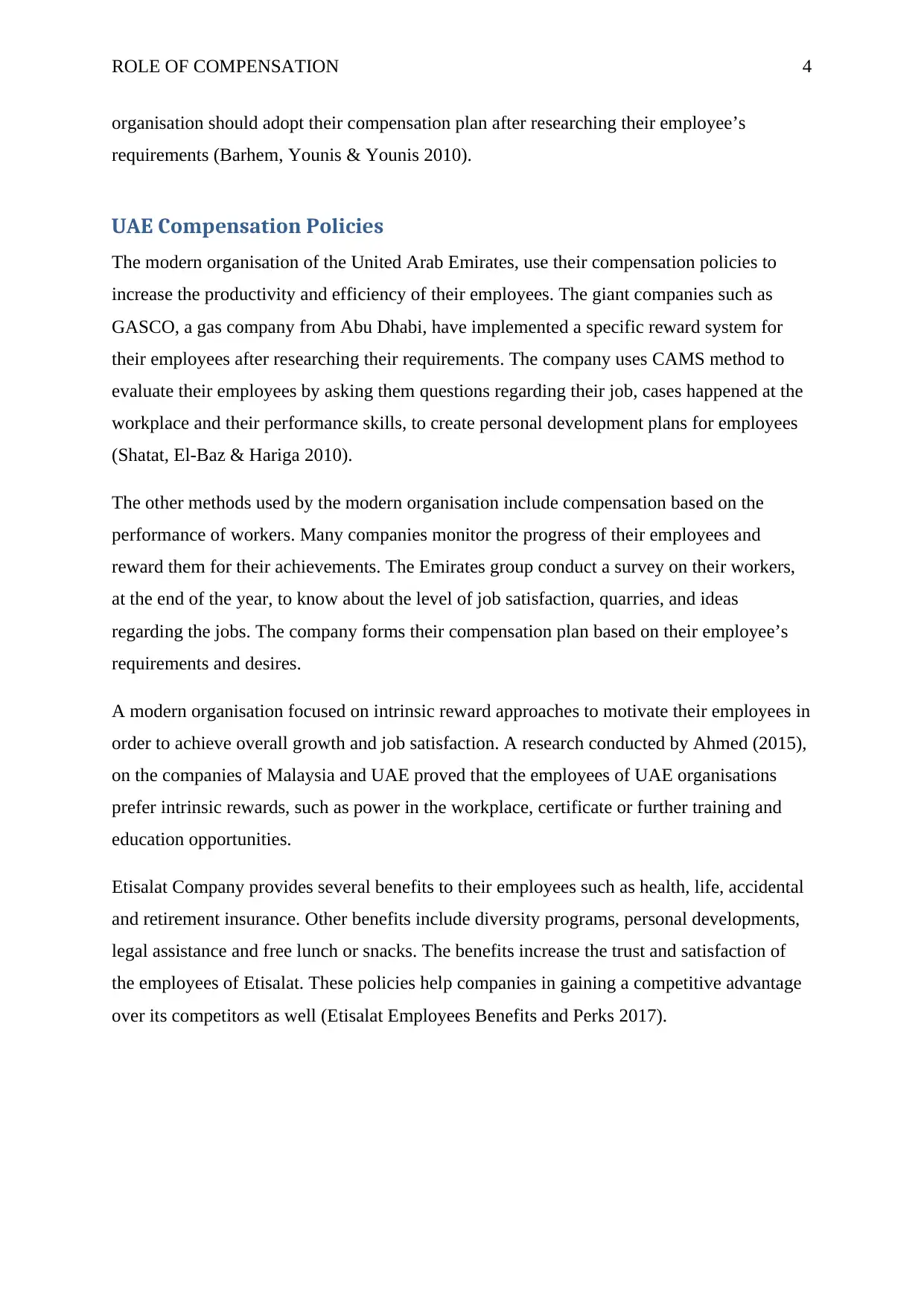
ROLE OF COMPENSATION 4
organisation should adopt their compensation plan after researching their employee’s
requirements (Barhem, Younis & Younis 2010).
UAE Compensation Policies
The modern organisation of the United Arab Emirates, use their compensation policies to
increase the productivity and efficiency of their employees. The giant companies such as
GASCO, a gas company from Abu Dhabi, have implemented a specific reward system for
their employees after researching their requirements. The company uses CAMS method to
evaluate their employees by asking them questions regarding their job, cases happened at the
workplace and their performance skills, to create personal development plans for employees
(Shatat, El-Baz & Hariga 2010).
The other methods used by the modern organisation include compensation based on the
performance of workers. Many companies monitor the progress of their employees and
reward them for their achievements. The Emirates group conduct a survey on their workers,
at the end of the year, to know about the level of job satisfaction, quarries, and ideas
regarding the jobs. The company forms their compensation plan based on their employee’s
requirements and desires.
A modern organisation focused on intrinsic reward approaches to motivate their employees in
order to achieve overall growth and job satisfaction. A research conducted by Ahmed (2015),
on the companies of Malaysia and UAE proved that the employees of UAE organisations
prefer intrinsic rewards, such as power in the workplace, certificate or further training and
education opportunities.
Etisalat Company provides several benefits to their employees such as health, life, accidental
and retirement insurance. Other benefits include diversity programs, personal developments,
legal assistance and free lunch or snacks. The benefits increase the trust and satisfaction of
the employees of Etisalat. These policies help companies in gaining a competitive advantage
over its competitors as well (Etisalat Employees Benefits and Perks 2017).
organisation should adopt their compensation plan after researching their employee’s
requirements (Barhem, Younis & Younis 2010).
UAE Compensation Policies
The modern organisation of the United Arab Emirates, use their compensation policies to
increase the productivity and efficiency of their employees. The giant companies such as
GASCO, a gas company from Abu Dhabi, have implemented a specific reward system for
their employees after researching their requirements. The company uses CAMS method to
evaluate their employees by asking them questions regarding their job, cases happened at the
workplace and their performance skills, to create personal development plans for employees
(Shatat, El-Baz & Hariga 2010).
The other methods used by the modern organisation include compensation based on the
performance of workers. Many companies monitor the progress of their employees and
reward them for their achievements. The Emirates group conduct a survey on their workers,
at the end of the year, to know about the level of job satisfaction, quarries, and ideas
regarding the jobs. The company forms their compensation plan based on their employee’s
requirements and desires.
A modern organisation focused on intrinsic reward approaches to motivate their employees in
order to achieve overall growth and job satisfaction. A research conducted by Ahmed (2015),
on the companies of Malaysia and UAE proved that the employees of UAE organisations
prefer intrinsic rewards, such as power in the workplace, certificate or further training and
education opportunities.
Etisalat Company provides several benefits to their employees such as health, life, accidental
and retirement insurance. Other benefits include diversity programs, personal developments,
legal assistance and free lunch or snacks. The benefits increase the trust and satisfaction of
the employees of Etisalat. These policies help companies in gaining a competitive advantage
over its competitors as well (Etisalat Employees Benefits and Perks 2017).
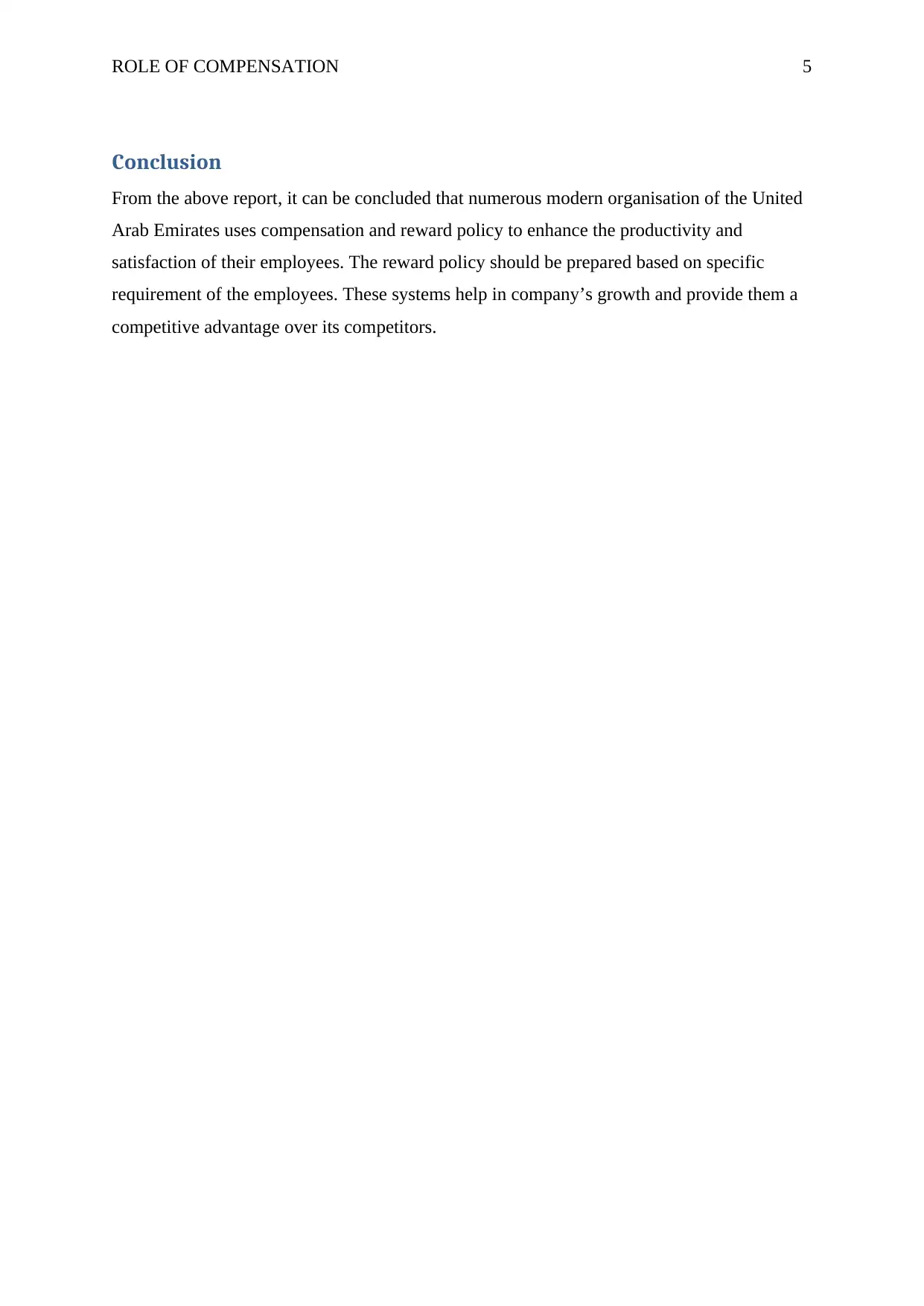
ROLE OF COMPENSATION 5
Conclusion
From the above report, it can be concluded that numerous modern organisation of the United
Arab Emirates uses compensation and reward policy to enhance the productivity and
satisfaction of their employees. The reward policy should be prepared based on specific
requirement of the employees. These systems help in company’s growth and provide them a
competitive advantage over its competitors.
Conclusion
From the above report, it can be concluded that numerous modern organisation of the United
Arab Emirates uses compensation and reward policy to enhance the productivity and
satisfaction of their employees. The reward policy should be prepared based on specific
requirement of the employees. These systems help in company’s growth and provide them a
competitive advantage over its competitors.
⊘ This is a preview!⊘
Do you want full access?
Subscribe today to unlock all pages.

Trusted by 1+ million students worldwide
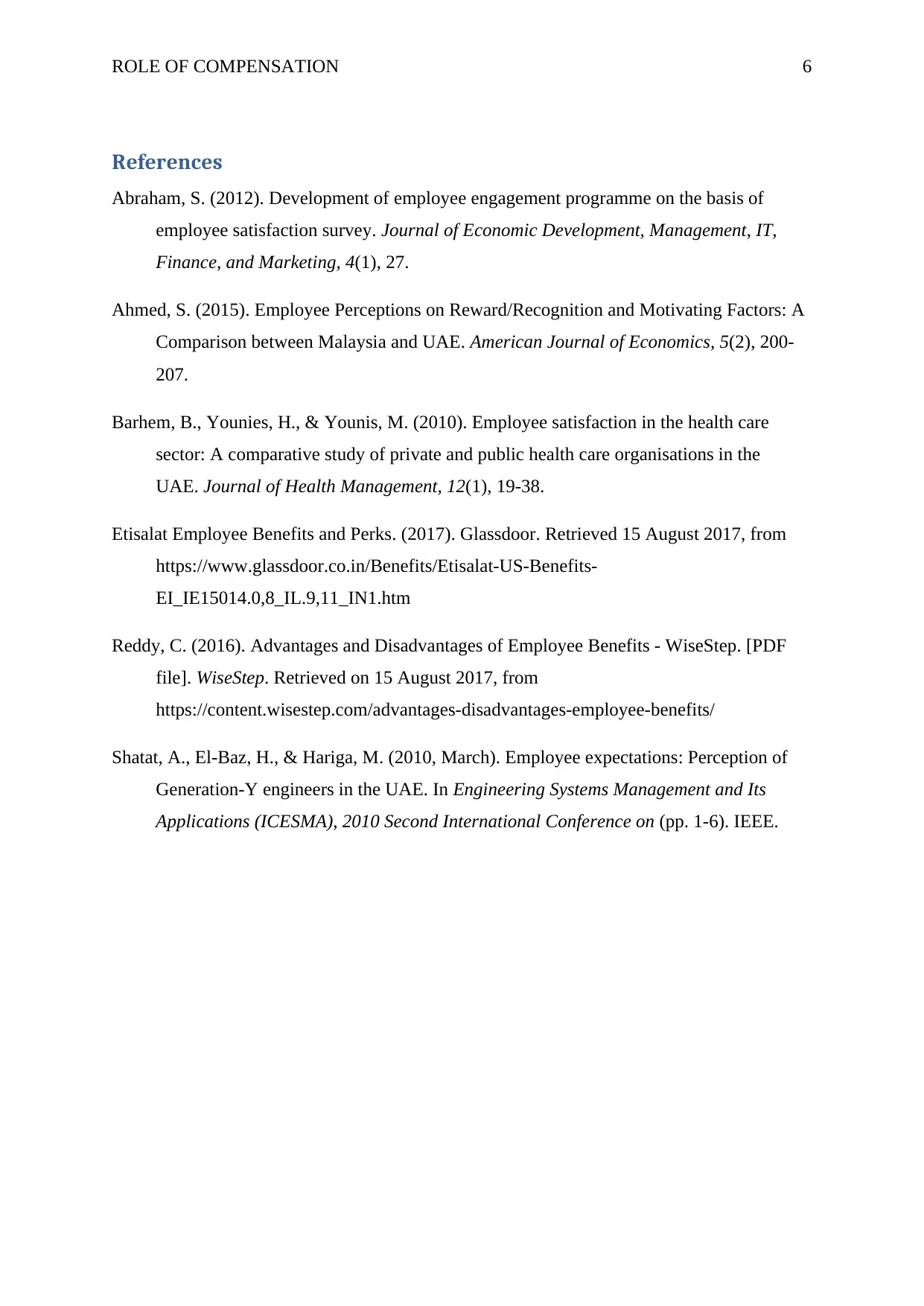
ROLE OF COMPENSATION 6
References
Abraham, S. (2012). Development of employee engagement programme on the basis of
employee satisfaction survey. Journal of Economic Development, Management, IT,
Finance, and Marketing, 4(1), 27.
Ahmed, S. (2015). Employee Perceptions on Reward/Recognition and Motivating Factors: A
Comparison between Malaysia and UAE. American Journal of Economics, 5(2), 200-
207.
Barhem, B., Younies, H., & Younis, M. (2010). Employee satisfaction in the health care
sector: A comparative study of private and public health care organisations in the
UAE. Journal of Health Management, 12(1), 19-38.
Etisalat Employee Benefits and Perks. (2017). Glassdoor. Retrieved 15 August 2017, from
https://www.glassdoor.co.in/Benefits/Etisalat-US-Benefits-
EI_IE15014.0,8_IL.9,11_IN1.htm
Reddy, C. (2016). Advantages and Disadvantages of Employee Benefits - WiseStep. [PDF
file]. WiseStep. Retrieved on 15 August 2017, from
https://content.wisestep.com/advantages-disadvantages-employee-benefits/
Shatat, A., El-Baz, H., & Hariga, M. (2010, March). Employee expectations: Perception of
Generation-Y engineers in the UAE. In Engineering Systems Management and Its
Applications (ICESMA), 2010 Second International Conference on (pp. 1-6). IEEE.
References
Abraham, S. (2012). Development of employee engagement programme on the basis of
employee satisfaction survey. Journal of Economic Development, Management, IT,
Finance, and Marketing, 4(1), 27.
Ahmed, S. (2015). Employee Perceptions on Reward/Recognition and Motivating Factors: A
Comparison between Malaysia and UAE. American Journal of Economics, 5(2), 200-
207.
Barhem, B., Younies, H., & Younis, M. (2010). Employee satisfaction in the health care
sector: A comparative study of private and public health care organisations in the
UAE. Journal of Health Management, 12(1), 19-38.
Etisalat Employee Benefits and Perks. (2017). Glassdoor. Retrieved 15 August 2017, from
https://www.glassdoor.co.in/Benefits/Etisalat-US-Benefits-
EI_IE15014.0,8_IL.9,11_IN1.htm
Reddy, C. (2016). Advantages and Disadvantages of Employee Benefits - WiseStep. [PDF
file]. WiseStep. Retrieved on 15 August 2017, from
https://content.wisestep.com/advantages-disadvantages-employee-benefits/
Shatat, A., El-Baz, H., & Hariga, M. (2010, March). Employee expectations: Perception of
Generation-Y engineers in the UAE. In Engineering Systems Management and Its
Applications (ICESMA), 2010 Second International Conference on (pp. 1-6). IEEE.
1 out of 7
Related Documents
Your All-in-One AI-Powered Toolkit for Academic Success.
+13062052269
info@desklib.com
Available 24*7 on WhatsApp / Email
![[object Object]](/_next/static/media/star-bottom.7253800d.svg)
Unlock your academic potential
Copyright © 2020–2026 A2Z Services. All Rights Reserved. Developed and managed by ZUCOL.




